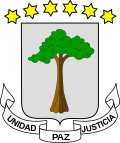Equatorial Guinea Council of Ministers
(Redirected from Equitorial Guinea Council of Ministers)
| Council of Ministers of the Republic of Equatorial Guinea | |
|---|---|
| Spanish: Consejo de Ministros de Guinea Equatorial French: Conseil des ministres de Guinée équatoriale Portuguese: Conselho de Ministros da Guiné Equatorial | |
 | |
| Overview | |
| Established | 12 October 1968 |
| Country | Equatorial Guinea |
| Appointed by | President of the Republic |
| Responsible to | President of the Republic Parliament |
| Website | Official website |
The Equatorial Guinean Council of Ministers or Council of Ministers of Equatorial Guinea, is chaired by the President of Equatorial Guinea Teodoro Obiang Nguema, and constituted by the Vice President Teodorín Nguema Obiang, his Prime Minister Manuela Roka Botey along with the other Ministers members of the governemt.[1][2]
According to the constitution, the council is in charge of assisting the president with the execution of the national policy and his political and administrative duties.[3]
Members of the Council of Ministers[edit]
The current Equatoguinean Government was appointed on February 2 of 2023, and is constituted by the following members:
| Cargo | Titular |
|---|---|
| President of Guinea Ecuatorial | Teodoro Obiang |
| Vice Presidente of Ecuatorial Guinea | Teodoro Nguema Obiang Mangue |
| Prime Minister of Ecuatorial Guinea | Manuela Roka Botey |
| First Deputy Prime Minister, Head of the Ministry of Education, University Education and Sports | Clemente Engonga Nguema Onguene |
| Second Deputy Prime Minister, in Charge of Relations with Parliament and Legal Affairs | Ángel Mesie Mibuy |
| Third Deputy Prime Minister, Head of Human Rights | Alfonso Nsue Mokuy |
| Minister of State to the Presidency of the Republic, in Charge of Missions | Alejandro Evuna Owono Asangono |
| Minister of State to the Presidency of the Government in Charge of Regional Integration | Lucas Abaga Nchama |
| Minister of State in Charge of National Security | Nicolás Obama Nchama |
| Minister of State in Charge of Foreign Security | Juan Antonio Bibang Nchuchuma |
| Minister Secretary General of the Presidency of the Government | Ramón Nká Ela Nchama |
| Minister of Foreign Affairs and International Cooperation | Simeón Oyono Esono Angüe |
| Minister of Justice, Worship and Penitentiary Institutions | Sergio Esono Abeso Tomo |
| Minister of National Defense | Victoriano Bibang Nsue Okomo |
| Minister of Finance and Budgets | Fortunato Ofa Mbo Nchama |
| Minister of Planning and Economic Diversification | Gabriel Mbega Obiang |
| Minister of Youth and Sports | Patricio Bakale Mba |
| Minister of Health and Social Welfare | Mitoha Ondo’o Ayekaba |
| Minister of Public Works, Housing and Urban Planning | Clemente Ferreiro Villarino |
| Minister of Labor, Employment Promotion and Social Security | Alfredo Mitogo Mitogo Ada |
| Minister of Agriculture, Livestock and Rural Development | Juan José Ndong Tomo |
| Minister of Fisheries and Water Resources | Francisco Medina Catalán |
| Minister of Mines and Hydrocarbons | Antonio Oburo Ondo |
| Minister of Electricity and Renewable Energy | Gervasio Engonga Mba |
| Minister of Information, Press and Radio | Pamela Nse Eworo |
| Minister of Social Affairs and Gender Equality | María Consuelo Nguema Oyana |
| Minister of Transport, Post Office and New Information and Communication Technologies | Honorato Evita Oma |
| Minister of Public Service and Administrative Reform | Eucario Bakale Angue |
| Minister of Commerce, Industry and Business Promotion | Benjamín Bakale Nkara |
| Minister of Civil Aviation | Norberto-Bartolomé Mensuy Mañe Andeme |
| Minister of Culture, Tourism and Craft Promotion | Rufino Ndong Esono Nchama |
| Minister of the Interior and Local Corporations | Faustino Ndong Esono Ayang |
Source[2]
References[edit]
- ^ "Appointment of the ministers of the new Government". PDGE. 2 February 2023. Retrieved 27 February 2023.
- ^ a b "The government of the Republic of Equatorial Guinea". www.guineaecuatorialpress.com. Retrieved 2023-10-26.
- ^ "The Constitution of Equatorial Guinea". The Government of the Republic of Equatorial Guinea. 1996-01-17. Chapter Three: The Council of Ministers. Archived from the original on 2008-06-28. Retrieved 2008-04-12.
